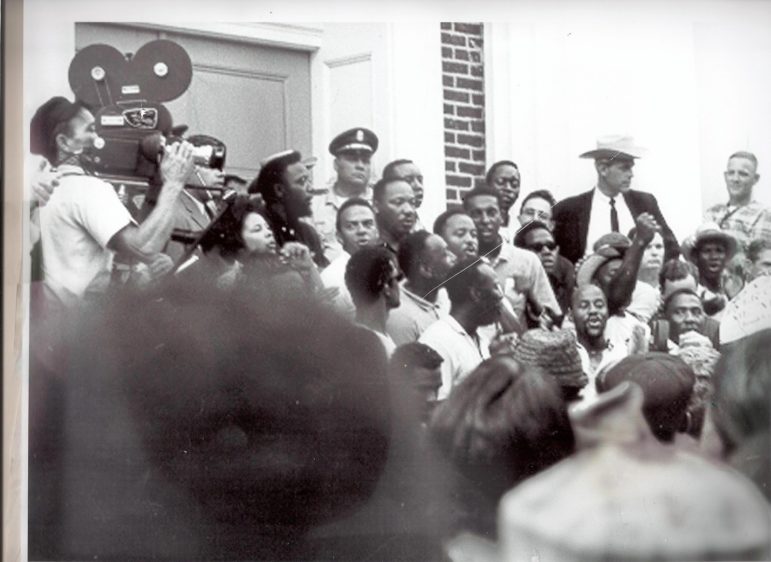Marked by an influx of advocates and three abominable murders, the summer of 1964 goes down in Mississippi history as a turning point of the civil rights movement. The story of Freedom Summer, during which hundreds of white, college-aged volunteers arrived in the state to work for voter registration, has been dramatized in movies and analyzed in books. And the Mississippi Civil Rights Museum, opening Dec. 9 in Jackson, will further lock that momentous time it into memories.
In 1964, the percentage of registered voters in Mississippi was lower than any other state’s. Freedom Summer was the brainchild of New York native Robert “Bob” Moses. A leader of the Student Nonviolent Coordinating Committee, Moses became co-director of the Council of Federated Organizations, an umbrella coalition of the major civil rights groups working in Mississippi. The council included the Student Nonviolent Coordinating Committee, the Congress of Racial Equality, the National Association for the Advancement of Colored People and the Southern Christian Leadership Conference.
The plan was to join the forces of those grassroots organizations with outside volunteers in order to overcome the white Citizens’ Council and Sovereignty Commission — two groups that perpetuated Jim Crow in Mississippi.
“It was a huge turning point for the country,” said Dr. Susan M. Glisson, co-founder and partner of Sustainable Equity, a minority consulting firm based in Oxford. “Civil rights activists in Mississippi had been working for several years without getting a lot of support or attention from the rest of the country (except for a lot of intimidation and violence), and they made the strategic decision to invite the sons and daughters of wealthy northerners to come to Mississippi because they knew that they had to exploit the nation’s own bias.”
![]()
Photo by Melanie Thortis
Images from Flonzie Brown-Wright’s book about her role as an election commissioner during the civil rights movement.
For James Chaney, Andrew Goodman and Michael Scherner, the decision proved to be fatal. On the night of June 21, Chaney, a 21-year-old black civil rights worker from Meridian, and Goodman and Schwerner, white workers from New York state, went missing in Neshoba County.
Schwerner, 24 years old, and his wife, Rita, had moved to Meridian earlier that year to establish a Council of Federated Organizations office. Chaney had been working with the Congress of Racial Equality for approximately a year, and Goodman, 20 years old, had just arrived in Mississippi from a Freedom Summer orientation in Oxford, Ohio.
The trio left the office in Meridian intent on investigating a black church burning outside of Philadelphia. Once within Neshoba County lines, though, they were arrested by deputy sheriff and Ku Klux Klan member Cecil Price. Later that evening, they were beaten, shot and buried by Klansmen linked to him. Their bodies weren’t found until early August and, despite damning evidence, the Mississippi state government refused to prosecute the white men involved.
![]()
Photo courtesy Flonzie Brown-Wright
Civil rights activist Flonzie Brown-Wright, far left, stands with civil rights leader Martin Luther King Jr., center, in Canton in 1966.
“We already knew they were dead,” said Flonzie Brown-Wright of Canton, one of many Mississippians who invited Northern volunteers into her home during Freedom Summer. Two years later, Brown-Wright became the first black woman elected to a public office in Mississippi post- or pre-Reconstruction when she won a position on the Madison County Board of Election Commissioners. And on April 28, 2017, Brown-Wright was recognized by former FBI Director James Comey for her more than 50 years of service to her community through civil rights advocacy.
“The question was to these young people — 18-, 19-year-olds — ‘Do you still want to go to Mississippi?’” Brown-Wright said. “We contacted their parents and told them, ‘You have an option to not go.’ Not one said no. They all said, ‘We’re going to catch those buses, and we’re going.’”
Patti Miller of Fairfield, Iowa, was one of those volunteers.
“I was very fearful, but I never once had the thought, ‘I’m not going,’” she said. “I think a part of it was my naiveté.”
Miller grew up in an all-white community and was unaware of Jim Crow in the United States until she visited the Deep South her junior year at Drake University in Des Moines.
![]()
Photo courtesy of Patti Miller
Patti Miller reads to children in Meridian during Freedom Summer.
“It was sort of like I became an activist overnight,” said Miller, who is president and founder of the Keeping History Alive Foundation. “I saw that they were separating the blacks from the whites, and it just infuriated me. Something in me just said, ‘This is so wrong.’”
When Miller returned to school, she saw a brochure about Freedom Summer hanging on a bulletin board on campus and immediately signed up. Because Miller was enrolled in summer school that year, she missed the large orientation in Oxford, Ohio, where Moses and other leaders taught volunteers of Mississippi’s social ways and how to physically defend themselves from harassment and violence. By the time Miller was on a bus to Jackson, where she would go through orientation at Tougaloo College, hundreds of FBI agents had been dispatched to the Magnolia State in search of the missing civil rights workers. Once in the state’s capital, Miller’s heart sunk when a worker called out her name and assigned city, Meridian.
“Of course, I knew that Meridian was where the three who had been killed were from,” she said. “So that bus ride from Jackson to Meridian was absolutely the most fearful time that I had the whole summer because I was completely alone. I was going into the heart of what I understood to be the territory where they were killing people, and I knew no one.”
![]()
Photo by Melanie Thortis
Civil Rights activist Flonzie Brown-Wright
Brown-Wright is no stranger to that feeling. As a branch manager for the NAACP in Canton in 1964, she often arrived at work to find a card under her door reading, “The eyes of the Klan are upon you.”
“I was just too afraid to be afraid,” Brown-Wright said. “It’s a strange dichotomy.”
But when it came to housing volunteers as she did during Freedom Summer and again two years later during a continuation of the voter registration project, Brown-Wright did not let fear intimidate her.
“I took them to the sheriff’s office, and I identified each one of them to the sheriff. I said, ‘These are my children. They’re going to be going door-to-door doing voter registration.’ And I said, ‘Don’t arrest them. Don’t beat them. Do not crack their heads. If anything comes up, you know where I live.’ I felt that I had to do what I had to do to protect them,” she said. Miller received similar comfort and security from her host in Meridian, Alice Robertson.
“I was never afraid when I was in her home. Never,” Miller said. “It couldn’t have been more comfortable or easy. She was so welcoming.”
According to Susan Glisson of Sustainable Equity, Freedom Summer was successful especially because of those “ways that local, black community members invited these strangers into their homes, and they demonstrated to the world that people who are not supposed to have anything in common could very quickly create a loving community.”
Dr. Robert Luckett, director of the Margaret Walker Center at Jackson State University, said Freedom Summer was made possible not only by the volunteers and not only by the black locals, but also by the hard work of the grassroots organizations.
“It speaks to the work of the people who made up COFO, who were on the ground,” Luckett said. “Particularly SNCC and the NAACP — those two organizations did more work in the state of Mississippi than any other two organizations.”
![]()
Photo by Melanie Thortis
Civil Rights activist MacArthur Cotton at Little Hill School Community Center in Kosciousko.
MacArthur Cotton was part of that network. Born in Kosciusko, Cotton knew early on that he wanted to attend Tougaloo College, like his older sisters.
“I wanted to go because it was a progressive place,” said Cotton, who joined the Student Nonviolent Coordinating Committee upon his admission. “But joining the movement? I think I was maybe born into it.”
Cotton’s civil rights work began early and spanned decades. While at Tougaloo, he worked with civil rights leaders Medgar Evers and Bob Moses, once witnessing the beating of a close friend who was hit with a circuit clerk’s pistol on the steps of the Walthall County courthouse. Later, Cotton and a group of civil rights workers were sent to Parchman (Mississippi State Penitentiary) where he hung by handcuffed wrists from a bar on the ceiling for three days.
“I never thought about wanting to give up,” he said. “What would that look like?”
When it came to Freedom Summer, though, Cotton played a more discreet role. First, he worked in Memphis to further orient the latecomers like Miller who had missed the Oxford, Ohio, session.
![]()
Photo by Melanie Thortis
Awards and accomplishments line a tabletop at Flonzie Brown-Wright’s home in Canton.
“You had some students that had been involved all their lives through their parents or whatever, and then you had what we called ‘Friends of SNCC’ who had been involved in local stuff for years,” Cotton said. “And then you had the other group who had read about it in the newspaper who were naturally green, and so what we tried to do was pair them with more experienced people. We had some that really looked like they might not cut it in McComb and maybe found something for them in Jackson or some of the places where we didn’t expect as much trouble.”
Later in the summer, Cotton worked in Jackson and all over the state doing behind-the-scenes work, such as delivering donated textbooks and other odd jobs “to keep things running smoothly,” he said.
That dedication to both the humdrum and risky became, for Cotton and Brown-Wright and so many other black Mississippians, a lifelong commitment to the movement.
“They’re both overlooked heroic figures,” Glisson, a founding director of the William Winter Institute for Racial Reconciliation. “MacArthur (Cotton) is one of the most modest, humble people I have ever met — just a quiet kind of strength.”
But for Cotton, it was never a matter of valor.
![]()
Photo by Melanie Thortis
Civil Rights activist MacArthur Cotton
“They were looking at it as a movement, and we were looking at it as a struggle — you know, survival,” he said of the Northern volunteers. “Not what we can do this year or year after next — what can we put in place that’s going to be substantial and is going to sustain us forever?”
The same is true for Brown-Wright, who has devoted more than half a century to that struggle.
“I felt that if I could just play a small role in awakening people to their rights, then I had an obligation to do that,” she said. “It wasn’t a choice. I just felt that I had to be involved and engaged in this movement. I was just caught up.”
And, ultimately, they both acknowledge that Freedom Summer, though violent, achieved its purpose.
“It was a success for what it was intended to do,” Brown-Wright said. “It brought awareness to the power structure that we all bleed red even though the color of your skin may be different than mine.”
![]()
Photo courtesy of Patti Miller
Patti Miller with Alice Robertson, who housed Miller during Freedom Summer
Miller, who worked with children at the Meridian Council of Federated Organizations office and community center during the summer of 1964, continues to learn from her life-changing experience as a volunteer.
“The lesson didn’t become apparent to me then, but in the long run, it’s that people can really make a difference,” she said. “I think it’s pretty much agreed that had it not been for Freedom Summer and the Selma to Montgomery campaign that the Voting Rights Act (of 1965) would not have been passed. That was because individual college students were willing to give up their summer and work in the civil rights movement that that was able to be brought to the forefront of people’s awareness and that pressure was put on the government to change things.”
Even 40 years after the fact, Freedom Summer was spurring change. In 2004 and 2005, Glisson worked with the community of Philadelphia, Miss., to reconcile its ugly past and bring charges against Edgar Ray Killen, a former KKK member and conspirator in the murders of the three civil rights workers. The work was a continuation of what happened in 1964 — a change in the mindset of a group of people.
“I think that they were able to really highlight the hypocrisy of the nation,” Glisson said. “I often say that when the country looks at Mississippi, they try to act as if they’re looking at a foreign country, but in reality, they’re looking in the mirror. And I think that Freedom Summer was the first shift in beginning to recognize that mirror.”
According to Robert Luckett of the Margaret Walker Center, that change was no small feat.
“That shift in power was incredible,” he said. “In terms of the 200 years of state history, that summer of 1964? That’s got to be in the Top 10.”
![]()
Photo by Melanie Thortis
Awards and accomplishments line the tabletops and hallways of Flonzie Brown-Wright
Educating people about Freedom Summer has the potential to cause positive change in Mississippi for its next 200 years, Glisson said. Fifty-three years after Freedom Summer, Patti Miller’s foundation teaches that those who forget the past are doomed to repeat it, after all.
“After the Killen trial and conviction in 2006, we were able to get legislation passed to mandate teaching civil rights and human rights history in Mississippi classrooms,” Glisson said.
Educating locals and visitors about those rights and the history of the struggle is the very goal of the new Mississippi Civil Rights Museum.
“I think that is going to create a shift. It’s going to be powerful,” Glisson said. “When people can engage with the history honestly and openly, it helps them shift in ways that are very effective.”
THE TWO MUSEUMS
![]()
Photo courtesy the Mississippi Department of Archives and History
A rendering of the Two Mississippi Museums, set to open in December to celebrate Mississippi’s bicentennial
The legacy of Freedom Summer, Emmett Till, Medgar Evers and other Mississippi-related people, events and incidents will be preserved by the museum.
“What the museum — and the wonderful people and scholars who are working — has done is that we’re getting images and audiovisuals that are going to bring the story of Freedom Summer together,” said Pamela Junior, director of the Mississippi Civil Rights Museum. “What’s important to us is for the children to learn about this movement because there’s so many movements going on now. The mission is to be able to share the stories of the Mississippi movement that changed the nation. What we want people to come out with is that, ‘If they did it, we can do it.’”
Both museums are a product of the Mississippi Department of Archives and History’s Two Mississippi Museums project.
“In the Mississippi Civil Rights Museum’s central gallery, visitors will experience ‘This Little Light of Mine,’ signifying that everyone has a light,” said Katie Blount, executive director of the department. “In the Museum of Mississippi History, a map made of Mississippians’ portraits embodies the museum’s theme: ‘One Mississippi, Many Stories.’”
The opening of the Two Mississippi Museums is “the centerpiece of the state’s bicentennial celebration,” according to Blount. The 200,000-square-foot center is located at 222 North St., in downtown Jackson and will include more than 22,000 artifacts, including fingerprint cameras and kits that would have been used by the Jackson Field Office of the Federal Bureau of Investigations after the disappearance and murders of the three civil rights workers during Freedom Summer.
For information on the two museums, visit www.mdah.ms.gov/2MM.





































































